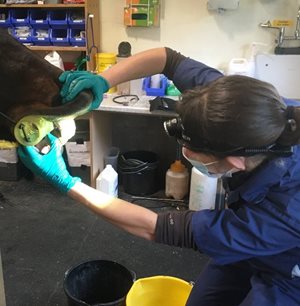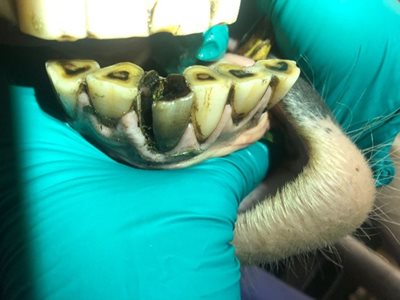Equine teeth are extremely important as the horse uses them to eat for around 18 hours a day. Kessock Equine Vets recommend that every horse, pony and donkey have their teeth examined at least once per year. Poor dentition can cause pain whilst eating, leading to quidding (partially chewed food being dropped from the mouth). Incompletely chewed food can lead on to other health problems such as oesophageal chokes, colic or in severe cases, weight loss. Poor dentistry can cause problems with ridden work such as issues with accepting the bit, difficulty in maintaining a contact and poor performance.
All our vets are well trained in equine dentistry and perform examinations and treatments regularly. Our vet Caroline has a particular interest in the subject, and is studying for her Certificate in Advanced Veterinary Practice (Equine Dentistry).


Services offered at Kessock Equine Vets include:
Routine dentistry
Horses have upper jaws that are slightly wider than their lower jaws, and their chewing action means that sharp enamel points frequently develop on the outside of their upper teeth, and the inside of their lower teeth. If left untreated, these sharp points can ulcerate the cheeks or tongue and cause oral pain.
A routine dentistry visit includes an examination and rasping with motorised equipment as required. We recommend this is performed every 6-12 months.
Diastema treatment
Horses cheek teeth should grind food working together as a single unit, but sometimes, small gaps called diastemata develop between the teeth. These trap food material in them, which can cause inflammation to the gums and subsequent pain. Diastemata can be treated by rebalancing the mouth using motorised rasps, widened and/or filled to prevent food from accumulating, or by having teeth extracted in extreme cases.
Investigations of poor performance
A thorough dental examination and treatment as necessary can be performed as part of a poor performance investigation
Investigations and of unilateral nasal discharge or swellings on the head
A discharge from your horse’s nose coming out of just one nostril (unilateral nasal discharge) can sometimes be a sign of sinus disease. Sinus disease is often caused by infection of a cheek tooth. This can be investigated by examining the mouth, x-raying the head, and nasal endoscopy as necessary. Swellings on the head can also frequently be related to dentistry problems, such as infected cheek teeth.
Oroscopy
Kessock Equine Vets have an oroscope (a rigid endoscope) used to examine the mouth in greater depth.
Some advanced treatments such as restoration of infundibular caries lesions, advanced tooth extractions or further sinus surgery may require referral treatments. Kessock Equine Vets regularly have clinics with a European Veterinary Dental Specialist from the Equine Dental Clinic to whom we can refer cases to as necessary.
What should I expect when I book a dental examination for my horse/pony?
The vet will ask you questions about how your horse has been eating, and (if applicable) how they have been responding during ridden work. A sedative is given to relax the horse and enable the examination to be carried out in more detail, this is included in the dentistry cost. The horse’s head will be placed on a head stand and the mouth examined with a mirror and headlight, with any abnormalities noted. In the majority of cases, routing rasping of the sharp enamel points will be required, and this is done with motorised equipment.
What facilities do I need?
Ideally, we carry out the examination in an enclosed environment such as a well-lit stable with a flat non-slip floor. Please have a bucket of warm water available for flushing your horse’s mouth.